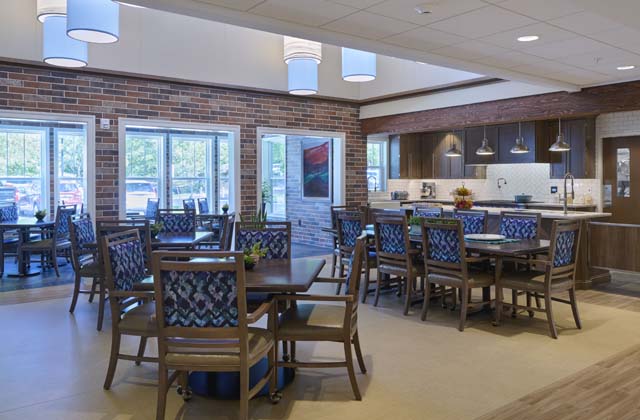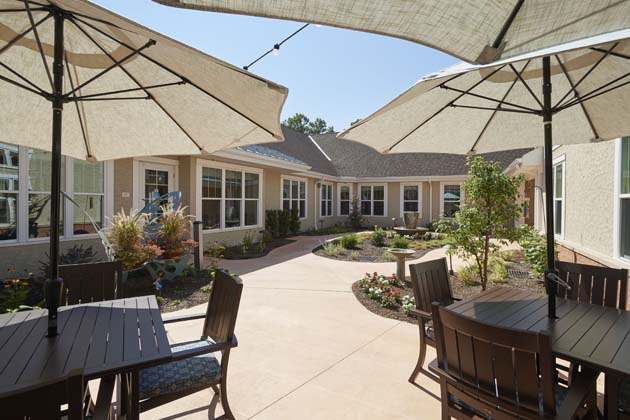Boutique Memory Care Facilities Designed for Comfort and Dignity
Boutique Memory Care Facilities Designed for Comfort and Dignity
Blog Article
Everything About Memory Care Services: Why Small Memory Treatment Residences Are a Terrific Selection
Memory care solutions play a vital role in supporting individuals with Alzheimer's and dementia. Tiny memory care homes attract attention for their customized strategy and intimate setting. With reduced staff-to-resident proportions, these homes foster stronger links and tailored care. Residents gain from enhanced social interactions and a safe environment. As households discover options, comprehending the unique benefits of tiny memory treatment homes comes to be essential. What factors should be thought about when selecting the right home?
Recognizing Memory Treatment Solutions
While lots of may be familiar with basic senior care choices, recognizing memory care services is necessary for families encountering the difficulties of cognitive decline. Memory care specifically accommodates people with conditions such as Alzheimer's condition and various other types of dementia. These solutions offer an organized environment that concentrates on improving the high quality of life for residents through specialized care and support.Memory treatment centers are designed to assure security and protection, often featuring protected atmospheres to avoid roaming. Educated employee are offered all the time to assist with everyday activities, drug monitoring, and individual care. In addition, memory treatment programs commonly consist of cognitive stimulation tasks, customized to engage homeowners and advertise mental wellness. Family members can profit from understanding these solutions, as they make it possible for notified decisions concerning their loved ones' care, guaranteeing that their particular demands and choices are attended to in a caring and encouraging fashion.
The Advantages of Small Memory Care Houses
Little memory care homes supply distinctive benefits that can significantly enhance the high quality of life for residents with cognitive disabilities. One considerable advantage is the intimate atmosphere, which enables individualized interactions amongst team and residents. This smaller sized setup promotes significant relationships, lowering sensations of isolation and anxiousness frequently experienced by individuals with memory issues.Additionally, the reduced staff-to-resident proportion in little memory care homes allows caregivers to give more attentive guidance and assistance. This method not only enhances safety yet additionally advertises a complacency for the residents.Moreover, small memory care homes can adapt rapidly to the distinct needs and preferences of each homeowner, permitting a much more homelike environment. Such a setting can motivate social interaction and engagement in activities, inevitably enriching the everyday experiences of those dealing with cognitive impairments.
Personalized Treatment Program for Locals
Personalized treatment plans are important in memory care homes, as they deal with the special requirements and preferences of each citizen. These strategies begin with comprehensive evaluations carried out by proficient experts, that assess cognitive abilities, case history, and personal rate of interests. This customized method warranties that care is not just efficient but additionally respectful of each person's dignity and autonomy.Moreover, customized treatment strategies are versatile, permitting modifications as citizens' needs advance in time. This adaptability cultivates a sense of safety and security and knowledge, which is necessary for people dealing with memory challenges. Caretakers are trained to implement these strategies continually, giving assistance that lines up with the homeowners' regimens and preferences.Ultimately, personalized care strategies enhance the top quality of life for locals by promoting self-reliance, interaction, and health, making them a basic facet of memory treatment services in tiny memory care homes.
Developing a Home-Like Environment
Creating a home-like setting is vital for fostering comfort and experience in memory care setups, as it considerably impacts citizens' emotional well-being. Tiny memory treatment homes usually prioritize customized touches, such as cozy shade palettes, family images, and acquainted furnishings setups, which help residents really feel much more at simplicity. Incorporating aspects reminiscent of a traditional home, like relaxing living rooms and common areas, urges a feeling of belonging.Moreover, using natural light and outside spaces can boost the environment, promoting relaxation and tranquility. Personnel play a substantial role in maintaining this environment by engaging with residents in a caring way, treating them like family members. Routine tasks, such as cooking or gardening, can additionally contribute to a home-like feeling, using opportunities for homeowners to take part in meaningful experiences. Generally, creating a supporting setting supports cognitive function and psychological security, making it a necessary element of memory treatment solutions.
Enhanced Social Interaction and Neighborhood
Improved social communication and neighborhood are crucial components of memory care services. By promoting individualized social engagement and creating a family-like atmosphere, these solutions promote significant connections among citizens. Team tasks and occasions better encourage participation, helping individuals feel extra included and sustained.
Individualized Social Involvement
While social interaction is essential for total health, numerous people with memory impairments usually struggle to engage meaningfully with others. Customized social engagement in memory treatment homes addresses this difficulty by developing tailored tasks that satisfy citizens' distinct rate of interests and abilities. By concentrating on private choices, caregivers can foster connections that resonate deeply with each individual. Activities such as art treatment, music sessions, and directed discussions advertise cognitive stimulation and psychological expression. Additionally, small team settings urge friendship and enable more intimate interactions, improving sensations of belonging. This method not only battles feelings of seclusion but also equips locals to keep a sense of identification, eventually browse around this site adding to enhanced mental health and quality of life.
Family-like Ambience
In a memory treatment setting, cultivating a family-like atmosphere significantly enhances social communication and develops a feeling of community among homeowners. Smaller sized memory treatment homes typically focus on intimate settings, allowing locals to create closer links with each other and team member. This nurturing ambience advertises trust, which is crucial for people with memory impairments. Residents are more probable to involve in discussions and share experiences, producing an encouraging network that eases feelings of solitude. The familiarity of shared spaces and regimens adds to a feeling of belonging, additionally motivating social communication (personalized memory care). In such setups, psychological bonds thrive, resulting in enhanced general health and a better of life for residents as they navigate their everyday experiences together
Team Activities and Events

Safety And Security and Protection Features in Tiny Houses
Several tiny homes developed for memory care include essential safety and security and protection features to ensure the health of homeowners. These homes typically make use of secure entrance and exit indicate stop straying, a typical problem among people with memory disabilities. Additionally, surveillance systems and alarm mechanisms improve monitoring, guaranteeing that staff can without delay reply to any kind of uncommon activities.Interior layouts are customized for safety and security, with reduced dangers such as clutter-free paths and sharp corners. Handrails and non-slip floor covering are commonly mounted to lower the risk basics of drops. Team participants are educated in emergency protocols, guaranteeing they are gotten ready for numerous situations.Moreover, personalized care plans may include analysis of individual security requirements, providing tailored options for each local. Generally, these safety and safety functions create a caring atmosphere where residents can thrive while preserving their self-respect and independence.
Exactly how to Select the Right Memory Treatment Home
Exactly how can families guarantee they select the most appropriate memory treatment home for their enjoyed ones? The choice needs mindful consideration of a number of elements. Households ought to evaluate the center's staff qualifications and training, ensuring that caretakers are experienced in handling memory-related conditions. Next off, it's important to assess the home's setting, concentrating on security attributes and whether it cultivates a sense of neighborhood and belonging. Checking out the facility can offer understanding into everyday tasks and the social environment, which are essential for mental stimulation and psychological well-being. Additionally, families reference need to ask about the care plans provided, ensuring they are tailored to specific requirements. Taking into consideration the home's place and accessibility for family check outs can add to a smoother shift. By resolving these aspects, families can make an enlightened choice that prioritizes their enjoyed one's comfort and lifestyle in a memory care setting.
Often Asked Inquiries
What Credentials Should Staff Members in Memory Treatment Residences Have?
Personnel in memory care homes should possess relevant certifications, experience in dementia treatment, solid interaction skills, and concern. Ongoing training in behavior management and healing interventions boosts their ability to support locals properly.
How Do Memory Treatment Solutions Differ From Traditional Assisted Living?
Memory care solutions focus specifically on people with memory impairments, supplying specific support and structured atmospheres. On the other hand, conventional assisted living offers general aid with day-to-day activities, lacking the tailored method required for those with cognitive obstacles.
What Kinds of Tasks Are Used in Memory Treatment Homes?
Memory treatment homes generally supply a variety of tasks created to involve homeowners. Typical options include art therapy, music sessions, cognitive games, physical exercises, gardening, and get-togethers, all focused on improving wellness and cognitive feature.
Can Citizens Bring Their Own Belongings to Memory Care Homes?
Residents can normally bring their own belongings to memory treatment homes, permitting them to individualize their space - personalized memory care. This practice assists produce a familiar setting, promoting comfort and a sense of identity for the individuals

How Are Relative Associated With the Care Refine?
Household participants play an important duty in the care procedure, typically taking part in decision-making, attending care conferences, and offering emotional support. Their participation cultivates a joint environment, improving the citizen's total well-being and top quality of life. While many may be familiar with general elderly care options, recognizing memory treatment services is crucial for family members facing the challenges of cognitive decline. These services give an organized setting that concentrates on boosting the quality of life for homeowners through specialized care and support.Memory treatment facilities are developed to assure security and protection, usually featuring protected settings to stop roaming. Individualized treatment plans are essential in memory care homes, as they provide to the distinct demands and choices of each homeowner. Team participants in memory care homes need to possess relevant qualifications, experience in dementia care, strong interaction skills, and empathy. Memory care services concentrate specifically on individuals with memory disabilities, providing customized assistance and organized atmospheres.
Report this page